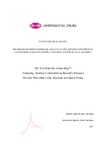“Do You Hear the Aliens Sing?”: Analysing America’s Alienation in Starkid’s Musicals The Guy Who Didn’t Like Musicals and Black Friday

Ver/
Use este enlace para citar
http://hdl.handle.net/2183/29776Coleccións
Metadatos
Mostrar o rexistro completo do ítemTítulo
“Do You Hear the Aliens Sing?”: Analysing America’s Alienation in Starkid’s Musicals The Guy Who Didn’t Like Musicals and Black FridayAutor(es)
Director(es)
Simal, BegoñaData
2021Centro/Dpto/Entidade
Universidade da Coruña. Facultade de FiloloxíaDescrición
Traballo fin de grao (UDC.FIL). Inglés: estudios lingüísticos y literarios. Curso 2020/2021Resumo
[Abstracts] This study will analyse how two of Starkid’s musicals, The Guy Who Didn’t Like Musicals and its sequel, Black Friday, engage in a critique of America through the figure of the alien. In order to describe how this is done, I examine the evolution of musical theatre, highlighting its social influence and commentary. This, combined with a study of how the alien has been used as a mirror of the troubles of humankind, will be the basis of my analysis of these plays, where I examine how the “other” can represent “us.” The analysis of these two comedy-horror musicals will revolve around the alien’s nature and role. At the same time, since both plays depict how America’s policies and politicians were corrupted before the alien invasion, I will argue that this corrupt capitalist system, where money becomes a religion, is the real origin of human apocalypse. Not only the public sphere, but also the private lives of the characters are shown to be monstruous, often deriving from dysfunctional families. The need of love or lust is one of the aspects that the alien takes advantage of, using the female body as a source and means of production. On this countdown to the end of the world, the heroes/heroines are tested, and they must realise who is the alien and whether they had been alienated all their lives. The critical approach chosen for this analysis is broad and eclectic, but it is indebted to ecocritical and posthumanist scholars (Åsberg and Braidotti, Nayar or Halberstam and Livingston, among others), complemented with Marxist criticism (when talking about the description of America’s capitalism) and feminist points of view (the industrialization and commodification of the female body). The main objective of this BA thesis is to demonstrate that the image of the alien, inserted in musical comedies, mirrors and magnifies the faults of humankind, serving as a commentary on our civilization. Finally, my conclusion is that The Guy Who Didn’t Like Musicals and Black Friday’s light-hearted comedies, mixed with the horror of the alien apocalypse, enact an inevitable disaster caused by earthlings’ mistakes. In this performative context, the audience is the “humankind,” observant of the “alien-performers” that provide a representation of the mistakes humanity makes.
Palabras chave
Musical theatre
Comedy
Horror
Science fiction
Alien
Starkid Productions
Black Friday
The Guy Who Didn’t Like Musicals
Capitalism
Comedy
Horror
Science fiction
Alien
Starkid Productions
Black Friday
The Guy Who Didn’t Like Musicals
Capitalism
Dereitos
Os titulares dos dereitos de propiedade intelectual autorizan a visualización do contido deste traballo a través de Internet, así como a súa reproducción, gravación en soporte informático ou impresión para o seu uso privado e/ou con fins de estudo e de investigación. En nengún caso se permite o uso lucrativo deste documento. Estos dereitos afectan tanto ó resumo do traballo como o seu contido Los titulares de los derechos de propiedad intelectual autorizan la visualización del contenido de este trabajo a través de Internet, así como su repoducción, grabación en soporte informático o impresión para su uso privado o con fines de investigación. En ningún caso se permite el uso lucrativo de este documento. Estos derechos afectan tanto al resumen del trabajo como a su contenido





